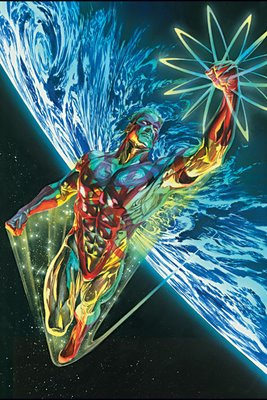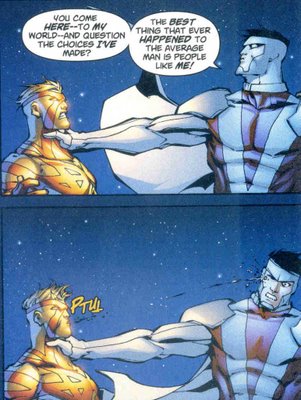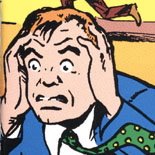If the Question was one of the greatest beneficiaries of Hypertime, his Charlton cohort Captain Atom was one of its greater victims. While new versions layered interesting characteristics and interpretations onto Vic Sage, the same versions stripped whatever was interesting about Nathanial Adam away. DC already had a nuclear powered accident survivor by the time Captain Atom was introduced, as well as military men turned weapons of mass destruction, and soldiers from another era trapped in the present. And once it was clear how he wasn't like those people, he became defined by only one aspect, and, as Dave Campbell points out, it's not a very compelling one:
Captain Atom is a tool. Whenever writers need an asshole superhero, they get Captain Atom. He’s constantly trying to beat up other heroes on behalf of the federal government.
And that's basically it. His defining feature is that he's as powerful as Superman, but he obeys the authorities, and it's
always the wrong choice to make. And since Captain Atom is also portrayed as honest and sincere, he comes across as insanely naive, if not a little mentally handicapped.
Which was why blasting him into the Wildstorm Universe in Will Pfeifer and Giuseppe Camuncoli
Captain Atom: Armageddon (trade paperback on-sale this week) was so brilliant.

When the Justice League butts up against President Luthor, the reader
knows the government is in the wrong and spends most of the time wondering what kind of stick is up Atom's ass that he can't see it too.
But when
The Authority cuts a swath of destruction across the Washington Mall, leaving the charred corpses of thousands of terrorists and tourists in their wake, and the President is left wondering if there was anything he can actually do, well suddenly the idea of a gold skinned god who limits himself to the will of the electorate starts to sound pretty appealing.
 Captain Atom: Armageddon
Captain Atom: Armageddon is probably the best inter-company crossover I've ever read (which I know isn't saying much but...) because it actually
contrasts the characters that meet, rather than the usual misunderstanding, fight and team-up model. The Wildstorm characters see the establishment asshole that Captain Atom is usually portrayed as. But from Captain Atom's point of view, he's trapped in a world ruled by amoral, hyper-violent superheroes who have terrified the populace into submission. There's no misunderstanding, they understand each other perfectly. That's
why they fight.
The whole book could be read as a contrast between the morally rigid Marvel heroes of the 1960s (Steve Ditko was one of Captain Atom's co-creators) and the violent, morally ambiguous Image heroes of the 1990s, a pastiche
Armageddon rings an almost literal death knell for. Having moved through the awkward adolescent rebellion phase of
WildC.A.T.S. and the "I'm at college so I must be right about everything" false maturity of
The Authority, a real adult, a crotchety old survivor of a forgotten era, has come to tell them that they are getting it wrong, and the world is in danger because of it.
And Captain Atom plays an interesting Ghost of Christmas Future. Like Mr. Majestic, he's a popular hero from a comics company bought by DC Comics. But while Mr. Majestic can still headline his own series (er, sort of), the Captain has been reduced to C or D-list status. His very presence screams "You may be a big shot in your own world now, but someday you're going to be a background cameo in
Infinite Crisis on Infinite Earths.
One day, I was like you. One day, you will be like me."
It suggests a model for future Captain Atom stories that could be interesting, the law abiding superhero in a world where the law isn't respected much, a walking conscience with the firepower to back it up.
The Boys of the Wildstorm Universe proper, if you will.
'Course, he's not in the Wildstorm Universe anymore, and in the DCU our sympathy will always be with Superman and Wonder Woman over the man in the shiny skin, so either he should go back (if only to make some more time with the Engineer) or he should get some new "heroes" to play with.
Play up some of the aspects of his
Watchmen analogue,
Dr. Manhattan, his disconnect from humanity due to his powers, and how that hurts him, rather than coldly interests him as it does his blue-bald twin. Add in a supporting cast of government employees who work with him and aid him. Some he can talk to, rescue, be rescued by. Maybe one or two villainous, or at least venal, bureaucrats, so the whole thing doesn't read like government propaganda. An anarchic villain or two who maybe have an actually good cause but poor methods.
There's a really good character there. Pfeifer and Camuncoli found him. And the gauntlet is thrown for the next writer to make him great.
Or you could just keep writing the unlikable establishment tool with the stick up his ass. If that's your thing.





